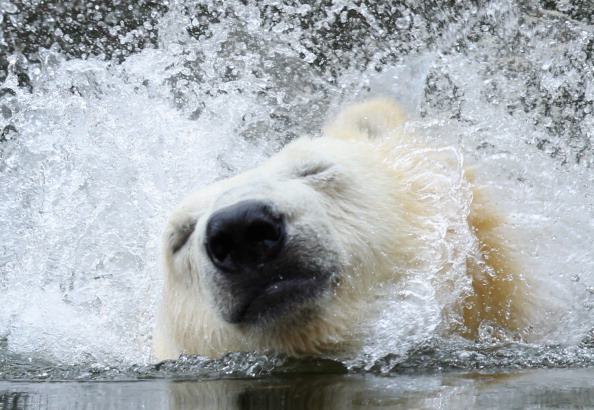Study: Polar bears could become extinct faster than previously thought


A free daily email with the biggest news stories of the day – and the best features from TheWeek.com
You are now subscribed
Your newsletter sign-up was successful
Researchers have found that polar bears have higher metabolisms than previously thought, and that's a scary discovery — with receding sea ice, it's harder than ever for polar bears to find enough food to survive, and there are fears that they might become extinct sooner rather than later.
The Arctic is warming twice as fast as the global average, and sea ice has declined by about 13 percent per decade since 1979. Researchers from the U.S. Geological Survey and U.C. Santa Cruz studied nine polar bears in Alaska over three Aprils, and found that they need to eat at least one adult or three juvenile ringed seals every 10 days for sustenance. Five of the bears were unable to get the necessary amount of food, and lost as much as 44 pounds over a 10-day period. The scientists realized polar bears have a metabolism that is 50 percent higher than prior estimates, but with climate change affecting their environment, it's becoming harder and harder to find enough seals to eat, and they are having to go farther to find food.
The polar bears have "a feast and famine lifestyle — if they missed out on seals it had a pretty dramatic effect on them," USGS biologist Anthony Pagano told The Guardian. "We were surprised to see such big changes in body masses, at a time when they should be putting on bulk to sustain them during the year. This and other studies suggest that polar bears aren't able to meet their bodily demands like they once were." The study was published in the latest issue of Science.
The Week
Escape your echo chamber. Get the facts behind the news, plus analysis from multiple perspectives.

Sign up for The Week's Free Newsletters
From our morning news briefing to a weekly Good News Newsletter, get the best of The Week delivered directly to your inbox.
From our morning news briefing to a weekly Good News Newsletter, get the best of The Week delivered directly to your inbox.
A free daily email with the biggest news stories of the day – and the best features from TheWeek.com
Catherine Garcia has worked as a senior writer at The Week since 2014. Her writing and reporting have appeared in Entertainment Weekly, The New York Times, Wirecutter, NBC News and "The Book of Jezebel," among others. She's a graduate of the University of Redlands and the Columbia University Graduate School of Journalism.
-
 Why is the Trump administration talking about ‘Western civilization’?
Why is the Trump administration talking about ‘Western civilization’?Talking Points Rubio says Europe, US bonded by religion and ancestry
-
 Quentin Deranque: a student’s death energizes the French far right
Quentin Deranque: a student’s death energizes the French far rightIN THE SPOTLIGHT Reactions to the violent killing of an ultra-conservative activist offer a glimpse at the culture wars roiling France ahead of next year’s elections.
-
 Secured vs. unsecured loans: how do they differ and which is better?
Secured vs. unsecured loans: how do they differ and which is better?the explainer They are distinguished by the level of risk and the inclusion of collateral
-
 Nobody seems surprised Wagner's Prigozhin died under suspicious circumstances
Nobody seems surprised Wagner's Prigozhin died under suspicious circumstancesSpeed Read
-
 Western mountain climbers allegedly left Pakistani porter to die on K2
Western mountain climbers allegedly left Pakistani porter to die on K2Speed Read
-
 'Circular saw blades' divide controversial Rio Grande buoys installed by Texas governor
'Circular saw blades' divide controversial Rio Grande buoys installed by Texas governorSpeed Read
-
 Los Angeles city workers stage 1-day walkout over labor conditions
Los Angeles city workers stage 1-day walkout over labor conditionsSpeed Read
-
 Mega Millions jackpot climbs to an estimated $1.55 billion
Mega Millions jackpot climbs to an estimated $1.55 billionSpeed Read
-
 Bangladesh dealing with worst dengue fever outbreak on record
Bangladesh dealing with worst dengue fever outbreak on recordSpeed Read
-
 Glacial outburst flooding in Juneau destroys homes
Glacial outburst flooding in Juneau destroys homesSpeed Read
-
 Scotland seeking 'monster hunters' to search for fabled Loch Ness creature
Scotland seeking 'monster hunters' to search for fabled Loch Ness creatureSpeed Read
